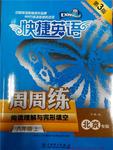题目内容
4. Mr. Johnson insisted that the problem worthy of attention at the meeting. (discuss)
Johnson先生主张在会上讨论那个值得关注的问题。
4. ( should) be discussed考查虛拟语气的用法G本题考查的是insist后的宾浯从句中的动词用法”在本句中insist应译为"坚持要求",因此后面的宾语从句要用shoulddo。而且本题为被动,因此用(should) be discussedo

练习册系列答案
 快捷英语周周练系列答案
快捷英语周周练系列答案
相关题目